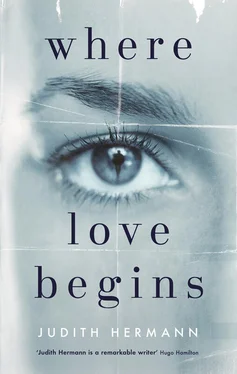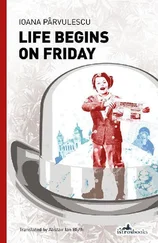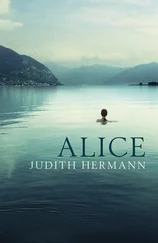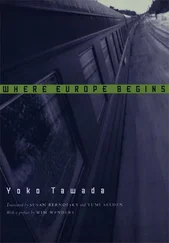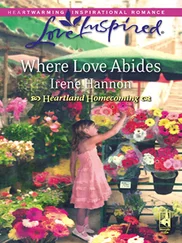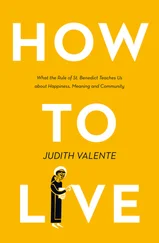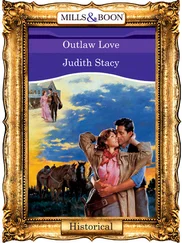It occurs to Stella that it might be risky to talk to Jason about her ideas of another life, a different profession. What is he supposed to say? But he’s laughing softly now and he says, Then just go ahead and do it. Not being Paloma, but everything else — why don’t you simply do it.
Because it isn’t simple, Stella says. At any rate, for me it’s not simple. Nothing in this world seems to be simple to me, except maybe preparing supper for Ava or putting fresh sheets on the beds or washing the dishes properly.
Jason nods. He turns on the windscreen wipers; the road is a dark green ribbon being rolled out before them, silky, wide. The rain blurs the beechwoods; the trees seem to fall into one another. It’s warm inside the car. Jason takes his right hand off the steering wheel to rub his head; putting his hand back on the steering wheel, letting it drop back on the steering wheel, he says, By the way, I walked by there.
Where did you walk by, Stella says; her stomach contracts, her heart suddenly pounds faster as if it had been waiting for this sentence, as if the sentence were a hideous cue.
Mister Pfister, Jason says. He pronounces the name in a funny way, something between hostile and revolted. I walked by Mister Pfister’s house; I had a look at it.
And…, Stella says.
Were you ever there, Jason says.
No, Stella says truthfully; no, I never was.
She’d thought about going past Mister Pfister’s house. Not in the days since Jason’s been home, but the day before Jason came back, on Friday. She thought about it, and she didn’t go by there; she didn’t want to look at it after all. What was there actually to see, and what for.
She says firmly, I don’t want to see it. I never go down the street in that direction, and I’m not going to do it now either.
Yes, Jason says, but he says it as if it weren’t about Stella but about himself and this was something completely different. I know. But I went down there and looked at it; it’s a totally normal house, exactly the same as ours. It doesn’t look either occupied or unoccupied. Anyway, he seems to live there alone; it has only his name on the door, and he wasn’t there. In case you were going to ask.
I would have wanted to ask that, Stella says. Of course I would have wanted to ask that. I would have asked you whether you’d seen him.
No, I didn’t see him, Jason says. He looks into the rear-view mirror as if something were approaching very fast, but the road behind them is empty.
He says, I don’t think he was there. For some reason I don’t think he was home.
Did you walk by or stop in front of it.
I stopped in front of it.
For how long, Stella says; she can’t help smiling.
Long enough, Jason says. Long enough in any case.
*
Back home, Paloma is sitting in Stella’s easy chair by the window watching television. She’s drawn her feet up onto the chair; she doesn’t look out as the car drives up. Jason gets out and opens the gate. Stella stays in the car; she sees Paloma through the windscreen, framed by the picture window like a painting — Paloma’s dependable figure in the flickering glow of the TV; she watches as Paloma casually takes a large swallow from her glass of water and puts the glass back on the table without taking her eyes away from what’s happening on the TV. For one moment Stella has a tremendous and simple longing for Clara. What would Clara do? She would be sitting in the kitchen and would certainly be eating something, a ham sandwich with mustard and pickles probably; the radio station would have been turned from classical music to pop; she’d have lit candles; she’d probably be drunk, and Ava would still be awake. In spite of that it’s a gift for Stella to have Paloma sitting in the armchair by the window. Taking Stella’s place for a short, maybe an important time.
Gifts like this, Stella thinks, are something new in my life. Didn’t exist before this. Or I didn’t recognise them?
*
The next day Jason takes Ava to kindergarten, comes back, packs his own suitcase, and is ready to drive off. He stands next to Stella in the garden watching as, her hands in yellow plastic gloves, she pulls the wind grass out of the rose bed, pulls dandelions up by the roots, stinging nettle, wild oats. The sunshine is incredibly bright. Stella sees her shadow, Jason’s shadow, and the distance between them.
She says, Did Ava cry. She can’t look at Jason.
No, Jason says. She didn’t cry. I think she’ll cry this evening. Will you call me.
We’ll call you, Stella says. She does get up after all and embraces Jason fiercely, exuberantly; then she lets him go.
What are you going to do about Mis-ter-pfis-ter, Jason says. He’s standing there as if she hadn’t embraced him.
What am I supposed to do about him. Stella has to squint because of the sun; she can’t properly see Jason’s face.
Do you want to hear my advice, Jason says, not waiting for an answer. You should stay out of it. You shouldn’t react to it. I’ve read about this; reacting signifies contact; that’s what it’s about; that’s what these people want. It’s sick.
I’ll stay out of it, Stella says. I’d stay out of it in any case. Where did you read this.
On the Internet, Jason says. On the goddamn, miserable Internet, where else.
*
Stella stands on the corner of Forest Lane and waves until the car with Jason in it has turned onto Main Street. She feels close to tears, and she doesn’t know where they’re coming from. Only later does she ask herself how she’s supposed to stay out of something that she herself didn’t cause; how is she supposed to control something that someone else is controlling. Jason’s cigarettes are lying next to his coffee mug on the table in the kitchen. He’s forgotten his jacket. He made the bed, leaving the bedroom window open. He read a report about a refugee camp in the newspaper; maybe he read the sentence, Space changes; the relationship to places and spaces changes in times of war before he got up from the kitchen table to drive to work, to drive off.
Ava doesn’t cry at all. But that evening she insists that Stella tell her a story. Stella should tell her some story. Ava won’t take no for an answer. For Stella telling such a story is like a free fall. The characters that Ava wants to hear about tumble around in Stella’s head, can only be held on to with great effort, they soar up and float off like helium-filled balloons.
Couldn’t I tell you a fairy tale, Stella says weakly.
No, Ava says, firm and unrelenting. Tell me the story about the little giraffe and the prince.
Stella tries. She tries; afraid to think that, years later, she might regret never having told Ava the story of the little giraffe and the prince. (Back then. One evening in May. You were four years old, and Jason wasn’t there. In that house in the suburbs where we used to live; I think you can still remember it a little. You had a room upstairs under the roof, your night-light was a globe; you always wanted to see the Atlantic Ocean on it. Outside your window there was the garden and a wild meadow; once we watched a buzzard; the buzzard caught a field mouse and flew away with it; you cried so hard; do you still remember? Back then. When I refused to tell you a simple story.)
This regret always stays with Stella. It is like a defect, like a tiny but important flaw in the system. Sometimes Stella thinks that Jason also feels this regret, but he passed the whole thing along to Stella; she took over his regret; she carries it with her. Why does she think this? Regret makes things difficult; at the same time unique, special.
*
The little giraffe can’t fall asleep. She’s lying next to the little prince and tries to close her eyes.
Читать дальше
